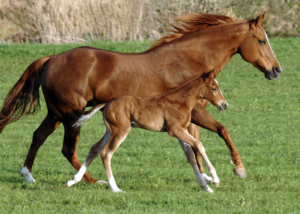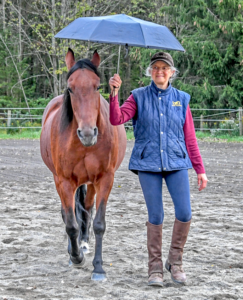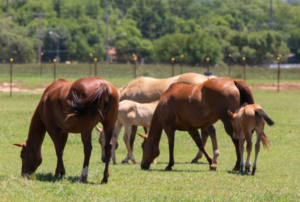 We love to hear from listeners and often incorporate listener questions or suggestions for topics and guests into our podcast. So, let us hear from you. Contacting us is easy here.
We love to hear from listeners and often incorporate listener questions or suggestions for topics and guests into our podcast. So, let us hear from you. Contacting us is easy here.
We offer these shows for free. If you think it’s worthy of a small contribution, we sure would appreciate it.
This is Episode 3 of Season 4, and in it, Jec talks with Lynn Acton, author of “What Horses Really Want.” Lynn and Jec discuss the behavioral and physical consequences of weaning early and how healthy weaning should go. Even if you don’t have or aren’t thinking of acquiring a young horse, I think this show will still interest you.
We try to steer clear of any anthropomorphizing, but you’ll hear that sometimes Lynn and Jec refer to horses in a human-y manner, which makes the topic more approachable without being romantic or inaccurate. Weaning how-to’s are closely associated with an article I wrote on imprinting. That’s a technique that some misguided professionals, including Dr. Robert Miller and Clinton Anderson, performed and advocated in what I sincerely hope are gone-bye days.

Lynn Acton
After that segment, we hear from Sampson Moss and his business, Prairie Wind Hat Works, as he discusses the finer details of crafting a custom hat.
Our title sponsor is Lucerne Farms, producers of quality forage feeds. It’s hay season, the rain has let up for a while, and the James family is busy in the fields of northern Maine. That’s where they’re cutting, tedding, and baling alfalfa and timothy. The forage, wrapped tightly in plastic, is perfect for traveling to competitions or horse camping vacations.
I have written a lot about the power of a good start and the hazards and pitfalls of a bad start. Mostly, I’ve talked about my experiences with restarting horses who have been in bad homes or with neglectful or abusive owners or trainers. But this weaning conversation gives us a whole new perspective on what good and bad starts can mean.
Dr. Sheryl King, professor emeritus at Southern Illinois University and a perenial favorite Best Horse Practices Summit presenter oversaw many weanings and had this to say:
“At the University we weaned at about four or five months and did so by removing one mare from the mare/foal pasture at a time until there were finally no adults in with the foals. After trying a number of weaning methods, this seemed to be the one that worked best for us and created the least stress for the foals.”
 Thanks to Redmond Equine and Pharm Aloe – for generously sponsoring our podcast. Check out Pharm Aloe’s aloe pellets which you can simply sprinkle on your horse’s feed and Redmond’s Rock on a Rope which you can simply hang on a fence. We think you’ll love ‘em.
Thanks to Redmond Equine and Pharm Aloe – for generously sponsoring our podcast. Check out Pharm Aloe’s aloe pellets which you can simply sprinkle on your horse’s feed and Redmond’s Rock on a Rope which you can simply hang on a fence. We think you’ll love ‘em.
Also thanks to Patagonia WorkWear for their continued support. Give us feedback, suggest a topic or guest, or make a donation and you’ll be automatically entered to win one of two free Patagonia WorkWear items that we give away every month. Don’t forget that Redmond Equine is sending a complimentary syringe of Daily Gold Stress Relief to everyone who drops a tip in our donation jar. Pretty cool and a $15 value. If you get something of value from our podcast, please consider making a donation. We sure would appreciate it.